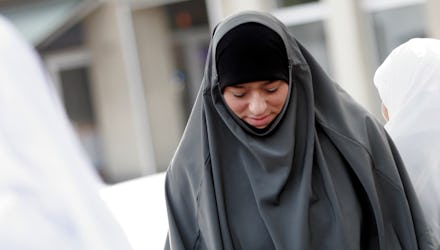French Company Bans the Hijab, and This Is Why People Are Angry About It

France's national motto, Liberté, Egalité, Fraternité (Liberty, Equality, Brotherhood) runs through the blood of the country — it captures a quest for national identity. (Think of it as the U.S. version of life, liberty and the pursuit of happiness). But the anatomy of France is in flux with its demographics radically changing, and with it, the politics of equality.
In upholding what he believes to be France's national identity, the CEO of French recycling company Paprec has banned his employees from wearing all religious attire. In theory, enforcing egalité and fraternité in this way is harmless and perhaps even honorabe, but its implementation has alienated sectors of the population who feel that their right to express themselves has been ripped out from underneath them.
Paprec's move is not the first in the private sector to spur angry debate. Just a few months ago, a Muslim woman was fired from her work at private nursery for wearing a headscarf. The courts backed the decision.
"I am applying the founding principles of the French republic," Paprec CEO Jean-Luc Petithuguenin told AFP.
Paprec's leadership claims it is simply applying French public law to the private sector. In 2004, the French court banned the wearing of all "conspicuous" religious items in public schools and other government buildings. But is the corporate move legal? Paprec's decision will probably make its way to French courts quickly.
"We plan to defend our point of view, to defend what we voted for as a group," Petithuguenin said in the same interview with AFP.
While the company's new rules ban items of all faith including yarmulkes, crosses and dastars, Muslim women who wear headscarves or hijabs feel especially targeted. Given the wave of legal battles and racially-motivated attacks in France over the last decade, this is not a surprise.
The laws apply to everyone, right? So what's the big deal? Many human rights activists assert viewing these laws racially-blind is not only wrong, but potentially dangerous.
"The proposed law is an unwarranted infringement on the right to religious practice," said Kenneth Roth, executive director of Human Rights Watch.
But a 2013 poll, the first of its kind, found that a whopping 84% of French people support bans on Islamic headscarves in private businesses. Once a relatively unified society, France is torn between preserving its traditional national identity and accepting its new demographic realities. While the national motto of liberty, equality, fraternity is inspiring, the search for identity is not benign. France's search for national identity will be fought out in the volatile political sphere, with the whole world watching.